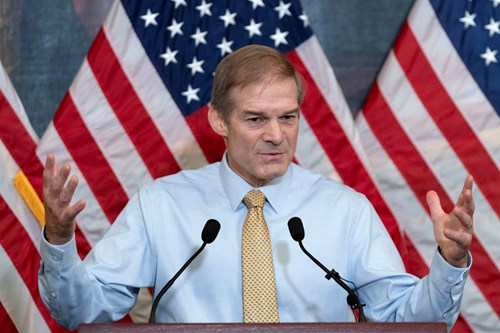Some critics of H.R. 6090, the Anti-Semitism Awareness Act, suggest it is weak, nice-sounding legislation compared to shocking images of tent cities on campus lawns, students taking over buildings, and a violent police response that is dominating the news cycle.
Other opponents say the bill, which makes anti-Semitism a violation of Title VI of the Civil Rights Act of 1964, is a dangerous overreach that threatens free speech.
 The bill passed the House on Wednesday by a vote of 320-91.
The bill passed the House on Wednesday by a vote of 320-91.
Prior to its passage, critics were warning the bill's definition of "anti-Semitism" creates serious First Amendment problems down the road. The bill's authors used the definition of anti-Semitism from the International Holocaust Remembrance Alliance, an intergovernmental organization.
The group, of which the U.S. is a member, adopted the definition in 2016:
Anti-Semitism is a certain perception of Jews, which may be expressed as hatred toward Jews. Rhetorical and physical manifestations of anti-Semitism are directed toward Jewish or non-Jewish individuals and/or their property, toward Jewish community institutions and religious facilities
“That’s some pretty lazy lawmaking,” New York attorney Ron Coleman, who is an Orthodox Jew, commented on American Family Radio Thursday.

Plenty of other Capitol Hill voices support Coleman’s position.
“Should people in America be prosecuted for saying things in all contexts? I think not. This is a poorly conceived unconstitutional bill,” Rep. Thomas Massie (R-Kentucky) wrote on X.
“The ability of the government to police thought, to police speech...you’re empowering that which should never be empowered,” wrote Rep. Chip Roy (R-Texas).
Jordan touts bipartisan support
Rep. Jim Jordan (R-Ohio), a yes vote on the bill, disagrees.
On the same radio show, Jordan told show host Jenna Ellis he was comfortable with the bill as presented, which included a list of 11 “examples” of anti-Semitism as expressed by the IHRA.
Conceding the legislation did refer to examples of conduct that is defined as anti-Semitic, Jordan said he was pleased the bill received bipartisan support.
"I was comfortable with the legislation," said the Republican lawmaker, "as were the vast majority of Republicans, and frankly, the majority of Democrats.”
 During his interview with Ellis, who agreed with his concerns, Coleman says the bill is poorly written and rife with First Amendment problems.
During his interview with Ellis, who agreed with his concerns, Coleman says the bill is poorly written and rife with First Amendment problems.
“It represents a political failure of the executive branch," he observed, "which the legislature feels that they can somehow remedy but they can't."
Secondly, he continued, it's "bad politics" when politicians are convinced they need to "do something" so they hurriedly pass a law.
"It’s not a matter of needing to do something, especially when you do something that may actually end up being counterproductive,” Coleman said.
Some critics say using the definition of an outside body leaves the law in a vulnerable position should the body, meaning Congress, modify its definition in the future.
The key, Jordan insisted, is not the definition but the dollars.
“We need to look at the money going to these campuses," he said. "We should start with that.”
Jordan links violent protests to student visas
Jordan, the chairman of the House Judiciary Committee, told Ellis that student visas for foreign-born student protesters need to be reconsidered. The committee has begun an investigation.
 “What’s going on at these campuses is radical conduct," he told Ellis. "It’s not First Amendment-protected speech when you have students who are taking over buildings, taking over the campus area, and harassing and intimidating and attacking Jewish students. That is just wrong."
“What’s going on at these campuses is radical conduct," he told Ellis. "It’s not First Amendment-protected speech when you have students who are taking over buildings, taking over the campus area, and harassing and intimidating and attacking Jewish students. That is just wrong."
Referring to the Immigration Nationality Act, what dates back to the 1950s, Jordan said that law is "clear" that foreigners who espouse or support terrorist activity can be removed from the U.S.
 He is calling on the appropriate government agencies, including the State Department, to begin the deportation process for qualified students.
He is calling on the appropriate government agencies, including the State Department, to begin the deportation process for qualified students.
Jordan said the campus protests represent a failure of leadership on multiple fronts, mostly the campus presidents and the Biden administration.
“Leaders are supposed to lead," he said, "and in many of these universities the leadership is not leading. And the White House doesn’t seem to be doing much of anything."







